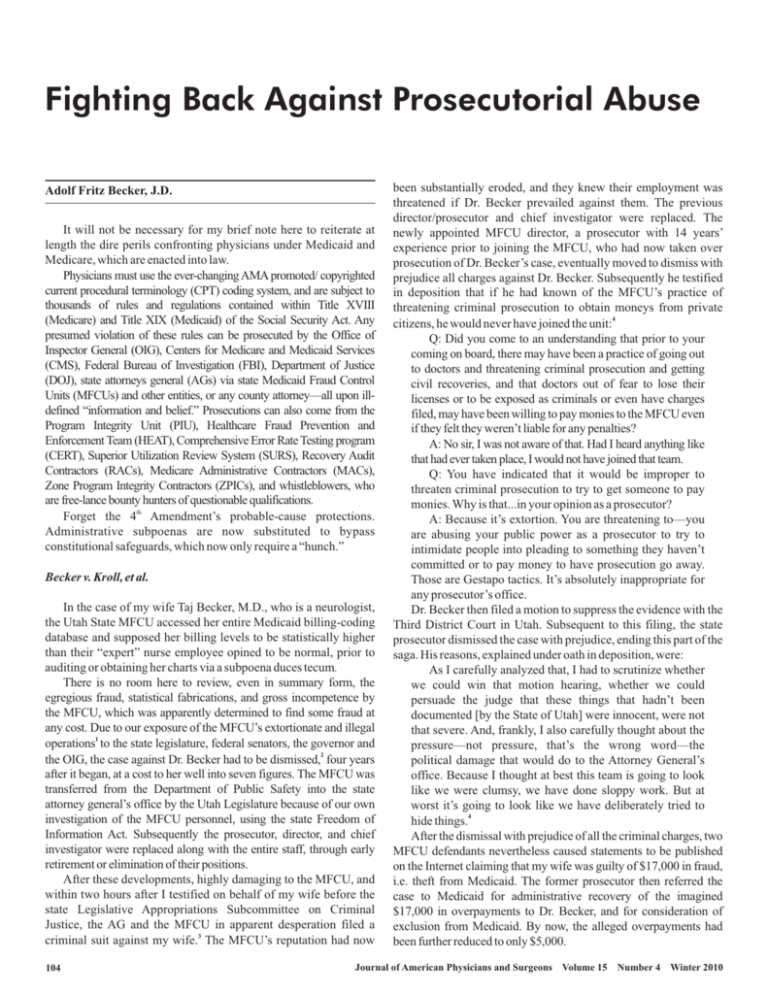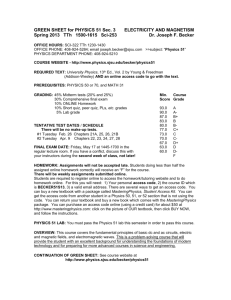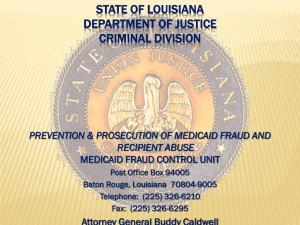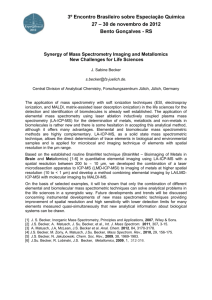Fighting Back Against Prosecutorial Abuse
advertisement

Fighting Back Against Prosecutorial Abuse Adolf Fritz Becker, J.D. It will not be necessary for my brief note here to reiterate at length the dire perils confronting physicians under Medicaid and Medicare, which are enacted into law. Physicians must use the ever-changing AMA promoted/ copyrighted current procedural terminology (CPT) coding system, and are subject to thousands of rules and regulations contained within Title XVIII (Medicare) and Title XIX (Medicaid) of the Social Security Act. Any presumed violation of these rules can be prosecuted by the Office of Inspector General (OIG), Centers for Medicare and Medicaid Services (CMS), Federal Bureau of Investigation (FBI), Department of Justice (DOJ), state attorneys general (AGs) via state Medicaid Fraud Control Units (MFCUs) and other entities, or any county attorney—all upon illdefined “information and belief.” Prosecutions can also come from the Program Integrity Unit (PIU), Healthcare Fraud Prevention and Enforcement Team (HEAT), Comprehensive Error Rate Testing program (CERT), Superior Utilization Review System (SURS), Recovery Audit Contractors (RACs), Medicare Administrative Contractors (MACs), Zone Program Integrity Contractors (ZPICs), and whistleblowers, who are free-lance bounty hunters of questionable qualifications. Forget the 4th Amendment’s probable-cause protections. Administrative subpoenas are now substituted to bypass constitutional safeguards, which now only require a “hunch.” Becker v. Kroll, et al. In the case of my wife Taj Becker, M.D., who is a neurologist, the Utah State MFCU accessed her entire Medicaid billing-coding database and supposed her billing levels to be statistically higher than their “expert” nurse employee opined to be normal, prior to auditing or obtaining her charts via a subpoena duces tecum. There is no room here to review, even in summary form, the egregious fraud, statistical fabrications, and gross incompetence by the MFCU, which was apparently determined to find some fraud at any cost. Due to our exposure of the MFCU’s extortionate and illegal operations1 to the state legislature, federal senators, the governor and the OIG, the case against Dr. Becker had to be dismissed,2 four years after it began, at a cost to her well into seven figures. The MFCU was transferred from the Department of Public Safety into the state attorney general’s office by the Utah Legislature because of our own investigation of the MFCU personnel, using the state Freedom of Information Act. Subsequently the prosecutor, director, and chief investigator were replaced along with the entire staff, through early retirement or elimination of their positions. After these developments, highly damaging to the MFCU, and within two hours after I testified on behalf of my wife before the state Legislative Appropriations Subcommittee on Criminal Justice, the AG and the MFCU in apparent desperation filed a criminal suit against my wife.3 The MFCU’s reputation had now 104 been substantially eroded, and they knew their employment was threatened if Dr. Becker prevailed against them. The previous director/prosecutor and chief investigator were replaced. The newly appointed MFCU director, a prosecutor with 14 years’ experience prior to joining the MFCU, who had now taken over prosecution of Dr. Becker’s case, eventually moved to dismiss with prejudice all charges against Dr. Becker. Subsequently he testified in deposition that if he had known of the MFCU’s practice of threatening criminal prosecution to obtain moneys from private citizens, he would never have joined the unit:4 Q: Did you come to an understanding that prior to your coming on board, there may have been a practice of going out to doctors and threatening criminal prosecution and getting civil recoveries, and that doctors out of fear to lose their licenses or to be exposed as criminals or even have charges filed, may have been willing to pay monies to the MFCU even if they felt they weren’t liable for any penalties? A: No sir, I was not aware of that. Had I heard anything like that had ever taken place, I would not have joined that team. Q: You have indicated that it would be improper to threaten criminal prosecution to try to get someone to pay monies. Why is that...in your opinion as a prosecutor? A: Because it’s extortion. You are threatening to—you are abusing your public power as a prosecutor to try to intimidate people into pleading to something they haven’t committed or to pay money to have prosecution go away. Those are Gestapo tactics. It’s absolutely inappropriate for any prosecutor’s office. Dr. Becker then filed a motion to suppress the evidence with the Third District Court in Utah. Subsequent to this filing, the state prosecutor dismissed the case with prejudice, ending this part of the saga. His reasons, explained under oath in deposition, were: As I carefully analyzed that, I had to scrutinize whether we could win that motion hearing, whether we could persuade the judge that these things that hadn’t been documented [by the State of Utah] were innocent, were not that severe. And, frankly, I also carefully thought about the pressure—not pressure, that’s the wrong word—the political damage that would do to the Attorney General’s office. Because I thought at best this team is going to look like we were clumsy, we have done sloppy work. But at worst it’s going to look like we have deliberately tried to hide things.4 After the dismissal with prejudice of all the criminal charges, two MFCU defendants nevertheless caused statements to be published on the Internet claiming that my wife was guilty of $17,000 in fraud, i.e. theft from Medicaid. The former prosecutor then referred the case to Medicaid for administrative recovery of the imagined $17,000 in overpayments to Dr. Becker, and for consideration of exclusion from Medicaid. By now, the alleged overpayments had been further reduced to only $5,000. Journal of American Physicians and Surgeons Volume 15 Number 4 Winter 2010 The Medicaid agency noted that Medicaid had not even paid 50 percent of the monies the MFCU claimed Dr. Becker had “stolen” from Medicaid. Subsequent to the administrative law process in 2002, to the MFCU’s dismay, after their blatant attempts at extortion through civil and criminal actions, the Medicaid agency’s own administrative law judge found that Dr. Becker had not up-coded and thus owed no overpayments. Thus, at the judicial hearing with evidence and sworn expert witness testimony presented, Dr. Becker was exonerated.5 With that adjudication in her favor, Dr. Becker filed suit in federal district court in Utah4 in an attempt to recover some of her litigation damages, which had accumulated over a 10-year period. On appeal, the U.S. 10th Circuit Court of Appeals in Denver6 partially overturned the Utah federal judge’s decision and remanded Dr. Becker’s claim of defamation (libel) to be tried against the prosecutor and the MFCU director/ chief investigator.7 This was remarkable in that fewer than 5 percent of decisions are reversed. The federal jury found them both guilty as charged, with the state paying damages to Dr. Becker. Hamlet’s Question What can a physician do today about prosecutorial abuse? First, I suggest that partially because of Dr. Becker’s efforts, MFCUs and other government agencies mentioned above have diverted much of their “recovery” efforts to the infinitely more lucrative assaults on large insurance companies, hospitals, and pharmaceutical corporations, where they can “recover” hundreds of millions of dollars by the mere threat of lengthy litigation, which would cost the defendant multimillions even if they won. Most will settle, often without conceding guilt, as a necessary cost of doing business. Your chance as a private practitioner of being shaken down on frivolous pretexts may seem rather small, but the sword of Damocles still hangs over you and your profession. AAPS immediate past president George Watson, D.O., has called upon you to oppose ObamaCare and preserve the honorable practice of private medicine as a member or contributor to the “Delta Force of Medicine.”8 I recall Shakespeare’s raising the question in Hamlet of: “Whether ’tis nobler in the mind to suffer the slings and arrows of outrageous fortune, or to take arms against the sea of troubles, and by opposing end them?” Each physician will have to answer the question for himself—considering financial and family demands and the chains that may keep a practitioner bound. Relatively few independent physicians will be able to succeed in their opposition acting alone. Many young doctors with medical school debts and young families are indeed left with few options other than to become employees at whatever reduced status, remuneration, and constrained decisionmaking it may entail. Moreover, Realpolitik cannot ignore that the American ethos of self-reliance and responsibility has been greatly eroded by the ruinous illusions of entitlements, since well more than half of our population receives some form of government subsidy. What patients, now called “consumers,” are not entitled to in the current system is excellent care from their doctors, who are now called “suppliers” or “providers.” The patients are really the biggest losers when doctors are abused. Physicians need to point this out vociferously. Those who believe it is nobler in the mind to oppose abuse, and feel morally compelled to act accordingly, must be warned that victory may not come quickly, or without the price that liberty has always demanded. Journal of American Physicians and Surgeons Volume 15 Nevertheless, we must resolve to fight for our dignity, come what may. I formerly lived in East Berlin under Soviet occupation, and I left the country of my birth because I had a great loathing for the criminal authorities’incessant demands for “your papers please” and the threat of the Gulag. Sadly enough, I now must produce my “papers”—licenses, bank accounts/transactions, tax information, e-mail contents, etc.—far more frequently than in communist East Germany. I fear that most of my fellow Americans uncritically, or unwittingly, stand at the depot with their suitcase packed ready to board a train that has “Auschwitz” as its destination. Aleksandr 9 Solzhenitsyn in The Gulag Archipelago recounted the day that the KGB awoke him in his apartment after midnight and asked him to tiptoe down the stairs so as not to disturb the other sleeping tenants. He recalls, ruefully, obeying the request. In his book, written after his inhuman ordeal in Stalin’s prison system, which he calls “our sewer system,” Solzhenitsyn laments that he should have screamed to awaken everyone to what was taking place. It is past time to leave the tiptoeing to the well-practiced AMA and to encourage every willing and brave colleague and patient to expose the ruinous chains fashioned by the government bureaucracy that not only ensnare physicians, but also choke American patient care. This resistance is not mainly to save doctors. In the final analysis it is a fight to restore lost freedoms to every American, present and future, in a struggle to save our republic. To the discerning mind this should not be dismissed as hyperbole. For physicians, resistance should include dropping out of Medicaid, and at least reducing Medicare to a feasible minimum. Educate our colleagues and patients. Become a member of the “Delta Force” as a matter of conscience. Let us not be discouraged. The present system of “ObamaCare” will inevitably sink under its own unsustainable weight. Be determined to give it a push to that end, and to take it out of its misery. Moreover, the recent election outcome should make it easier to approach members of the House of Representatives and Senate who have pledged to reverse the Democrats’“healthcare reforms.” Adolf Fritz Becker, J.D., was born in 1938 in Berlin, Germany. He immigrated to the U.S. in 1956 and served in the U.S. Army 1957-1959. He received a Masters in Political Science from Brigham Young University and a J.D. from the University of Utah. He has been an administrator in the Utah Attorney General’s Office. He was deputy campaign director in the western U.S. for Reagan-Bush in 1984. Contact: (435) 688-7800. REFERENCES 1 2 3 4 5 6 7 8 9 Doctor can sue for retaliation and libel. AAPS News 2007;63(10):3. Available at: http://www.aapsonline.org/newsletters/oct07.php. Accessed Nov 11, 2010. Doctor v. prosecutor. AAPS News 2005;61(7):3. Available at: http:// www.aapsonline.org/newsletters/july05.htm. Accessed Nov 11, 2010. 3rd District Court, State of Utah, Crim. 007900485-FS, filed Jan 11, 1999. Becker v. Kroll et al., 2:02-cv-24-TS, U.S. District Court—Utah, filed Aug 12, 2003. Utah Department of Heath, Admin. Case 01-009-26, Judge Lambertus Jansen finding, Apr 15, 2002. Becker v. Kroll et al. Nos. 05-4070 & 05-4096 (D.C. No. 2:02-CV-24DAK)—10th Circuit Court of Appeals Mandate, Aug 13, 2007. Becker v. Kroll et al., 2:02-cv-24-TS, Document #297 (final ruling [US District Court—Utah]), Feb 8, 2010. Watson GR. AAPS: helping physicians break free. J Am Phys Surg 2010;15:37. Solzhenitsyn A. The Gulag Archipelago. Harper & Row; 1973. Number 4 Winter 2010 105






